Care Career Guides: How To Become a Nurse in the UK
Out of all the careers you can choose from, becoming a nurse is by far the most rewarding but it can also be quite challenging.
As a leading care professional provider, we’d like to make it easier for those who are thinking about nursing as a career, by breaking down all you need to know.
So let’s look into what’s involved in becoming a nurse today in the UK.
Ask yourself “Why do you want to be a nurse?”
There are many reasons people want to become a nurse. For some it’s hereditary. You might have seen your entire family working as nurses and want to follow in their footsteps. For others, it could be the desire to care for others, and right now that couldn’t be needed more.
No matter why you want to become a nurse, you can be safe in the knowledge that you are choosing a rewarding and worthwhile career.
Better still, as far as choosing nursing as a career goes, you’ll never be stuck for work. Nurses operate all around the world and there aren’t many countries that won’t need people in your chosen profession.
Here are some stats that support choosing nursing as a career:

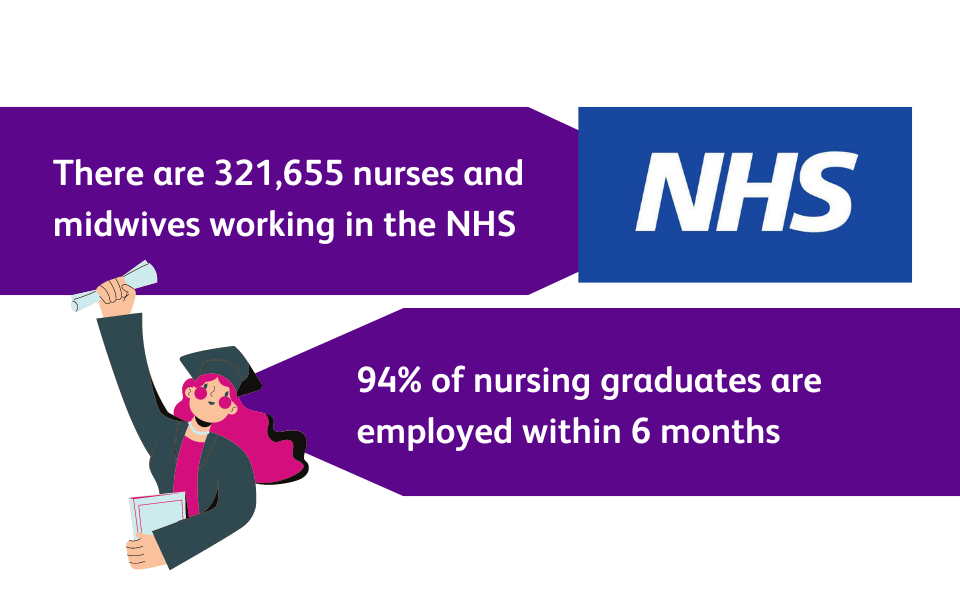.png)
So, what kind of person can become a nurse?
Once you’ve made the decision that you want to be a nurse, you need to consider if you have what it takes, beyond being qualified.
Thankfully the NHS has put together a handy little checklist for people who are thinking about nursing as a career to go through. Check out the NHS 6 C’s.

Care
An obvious one but, as we say at Nurseplus, care goes beyond the job. Caring means you are there to improve the lives of the individuals and communities in your care. When you become a nurse, your care needs to extend beyond your working hours, you need to care about the job of course but also deliver consistent care tailored to every person you work with.
Compassion
Being a nurse means you’ll need to have a certain level of empathy and respect for the people in your care. As a nurse, you’ll need to be kind and knowledgeable whilst always remaining focused on building trusting relationships with your patients.
Competence
When you become a nurse you are instantly recognised as a font of healthcare knowledge. It’ll be up to you to provide patients with a reliable, trustworthy source of advice and support. You’ll need to be able to apply all that you know to improve the life quality of your patients.
Courage
It’s a bold choice to choose nursing as a career. There’s not only the obvious pressure of being able to deliver consistent care but on top of that, you also have to be the voice of your patients, you need to stand up when you have concerns, you need to be able to embrace challenges and face them head on when they arise.
Commitment
Once you’re a nurse, you are usually in it for the long haul. Health and social care all over the world is continuously changing and adapting to the way we all live. Nurses are needed to take action to make the changes needed as well as support and encourage improvement at every opportunity.
Communication
Not only an important C for your patients but also essential for efficient operations within all the working environments a nurse can find themselves. Well-honed communication skills will be called upon when building caring relationships with those you care for as well as those you work with.
Will you need qualifications to be a nurse?
Since 2008, it became absolutely essential to have a degree when you want to become a nurse, and even before you go for a university placement you’ll need at least 5 GCSE’s C and above (English and Science Inc.) and 2 A Levels or the equivalent Level 3 qualification such as:
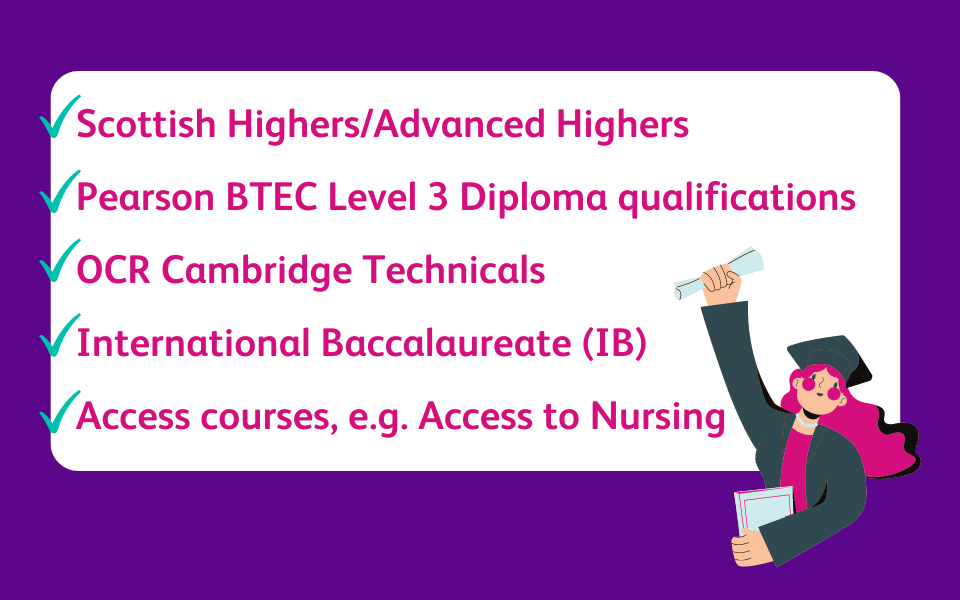.png)
Access courses can include access to nursing once you meet the entry criteria, you can choose from a huge number of top universities that offer a wide range of nursing degrees, and because choosing where to study can be tricky but we’ve found a list of top universities that offer nursing degrees all over the country.
Funding whilst studying nursing
Nurses who are studying to become can also apply for government funding to support their learning and pay for tuition. Controversially the grant has been reduced significantly from the pre-2016 amount of £10,000 to £5,000. Thankfully further funding is still being provided in areas that are in need of certain types of nurses.
The rest of the funding will be up to you and that’s where things like student loans, and care professional providers like Nurseplus can help.
You can also check out the Learning Support Fund for help with things like childcare and travel expenses.
Alternative paths to becoming a qualified nurse
It’s not always 100% necessary to go to university when you choose nursing as a career. There are also opportunities to enroll in a nursing degree apprenticeship. This course means you will not need to secure funding for your studies, as your employer will cover the costs plus you’ll gain some valuable work experience at the same time as you are learning to become a nurse.
How long does it take to become a nurse?
The length of time it takes to become a nurse can vary depending on which course of study you opt for. When studying to be a nurse in university, you’ll study for 3 years. During this time you’ll enjoy a mixture of lesson and lecture-based study as well as work placements throughout your course.
The typical time to complete a nursing apprenticeship will be around 4 years. This can change depending on the time you take off for holidays, or any additional study you enter your course with which can lessen the time.
What are the different types of nurses?
This is the great thing about choosing nursing as a career, you can excel in many different areas of nursing and better still nurses are needed all over the world.
You could choose to work with a nursing agency, like Nurseplus, for greater flexibility and varied working environments. You’ll gain an invaluable level of experience that may influence your career path to a specialty level. Plus, you can fit your work around your lifestyle, extra study, childcare, and other life commitments.
The NHS is a popular choice for qualified nurses, or you can head overseas and travel whilst caring for people in healthcare establishments all over the world. Below you can see a breakdown of the different nursing roles in the UK today.
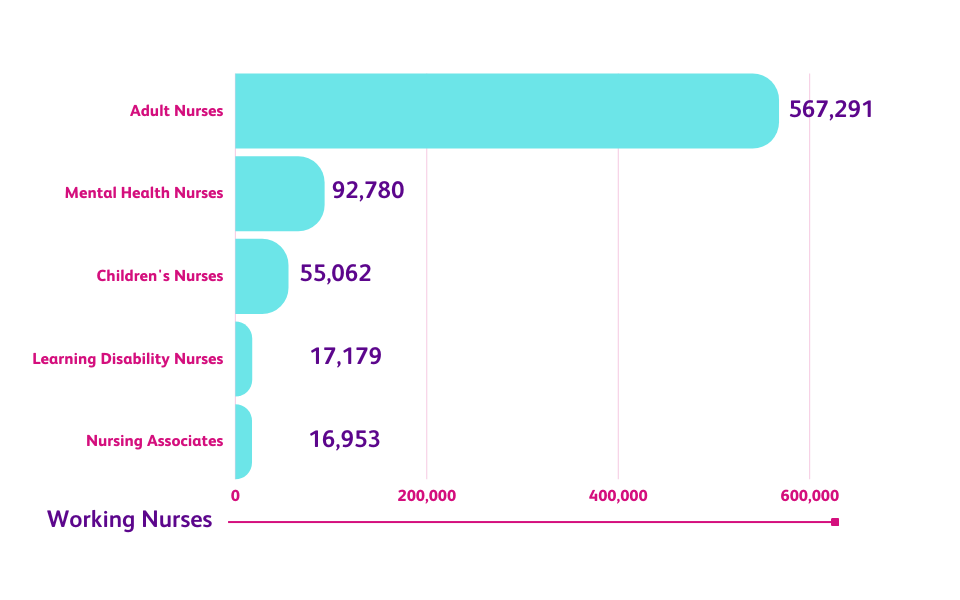.png)
Better still, when you are studying to become a nurse, you can choose the field that best suits your skills or take a dual-field degree if you are unsure which path to take or would like a bit of variety. Once qualified, nurses can look forward to plenty of opportunities for career progression, amazing earning potential and a fantastic pension.
What is the salary for registered nurses?
As a registered nurse, your earning potential is essentially uncapped, depending of course on what avenue you choose to go down. Your earnings will also depend on where you live and your level of experience after qualifying.
Nursing pay grades are set out in bands from 5 to 9 and you can see which roles and salaries apply to which band below, these pay bands are based on the NHS salaries at the time of writing this.
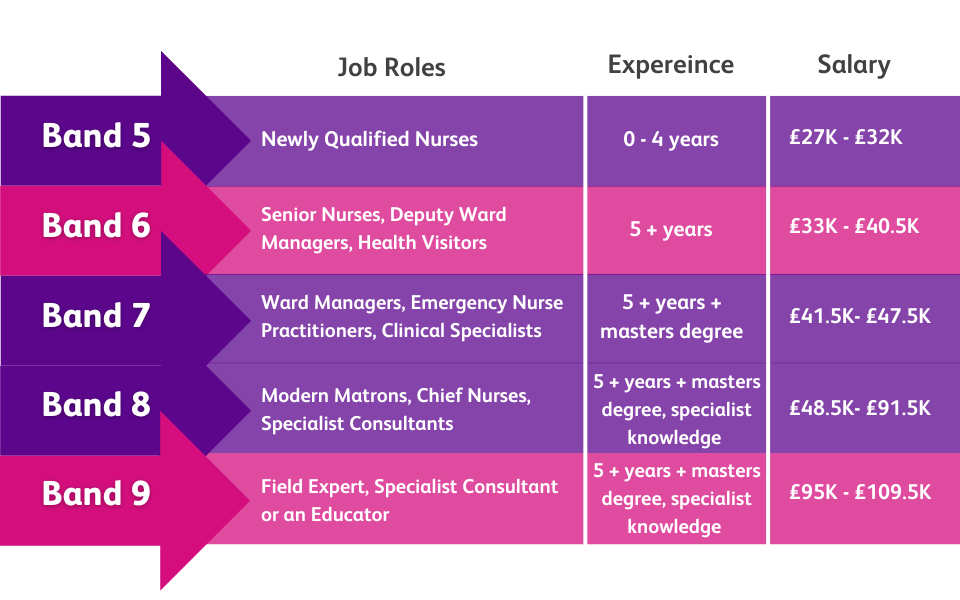.png)
How much do nurses earn at Nurseplus?
When you work with Nurseplus, how much you earn will depend on where you work and your level of experience.
We pay our nurses between £20 and £44 per hour and our wages are paid weekly. Nurseplus also offer nurses a £250 joining bonus* and we pay £1000 referral* for every other nurse you refer to register with us.
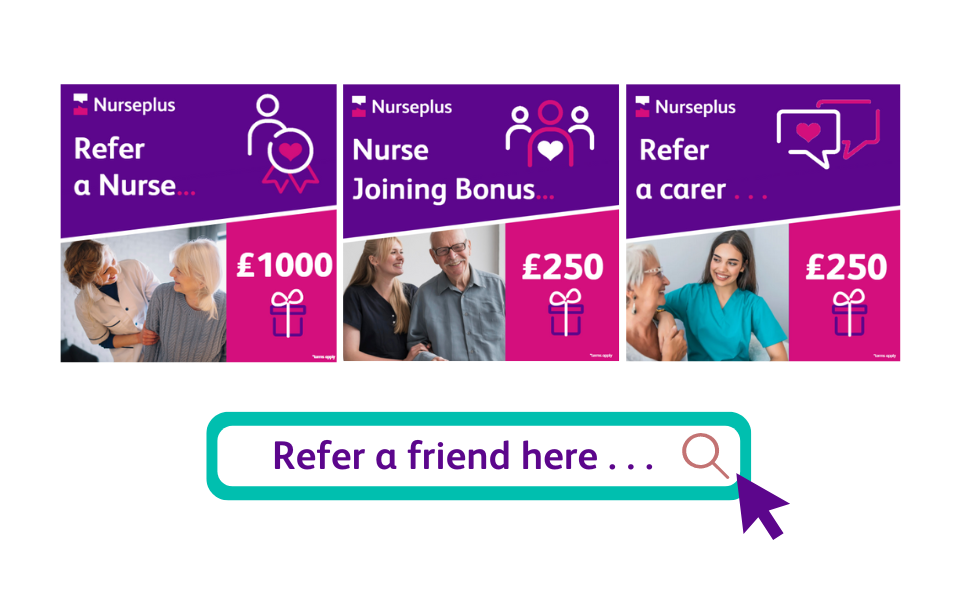.png)
Nurseplus will also help take the stress out of Revalidation for our nurses. We know how confusing and time-consuming the process is, so we offer full Revalidation support when you are registered with us.
Where you can work when you become a nurse
After qualifying nurses tend to head straight for employment in the NHS but there’s more out there. But did you know as a nurse you can choose your environment to suit your qualification and set personal career goals for yourself?
For example, if you chose to become a nurse to help people in your local community, roles will be available in a number of walk-in centres, clinics, and community organisations. You could choose to climb the ladder in your chosen field and reach for Advanced Nurse Practitioner, Matron Roles or Nurse Consultancy.
Furthermore, nurses are also valued in many professional environments such as schools, prisons, and cruise ships, even in the armed forces. Once you are a qualified nurse the choice is yours.
At Nurseplus, we offer registered nurses the chance to work in a huge range of environments, and better still, we will work around their availability. For this reason, we have nurses that work with us to supplement a full-time job elsewhere and others that work full-time hours with us that fit around their lifestyle.
Let's look at Private vs NHS vs Bank/Agency
There’s a lot to consider when you become a nurse, mainly where and when you want to work. That’s why decided to lay out some pros and cons of nursing jobs in different sectors of the healthcare industry.
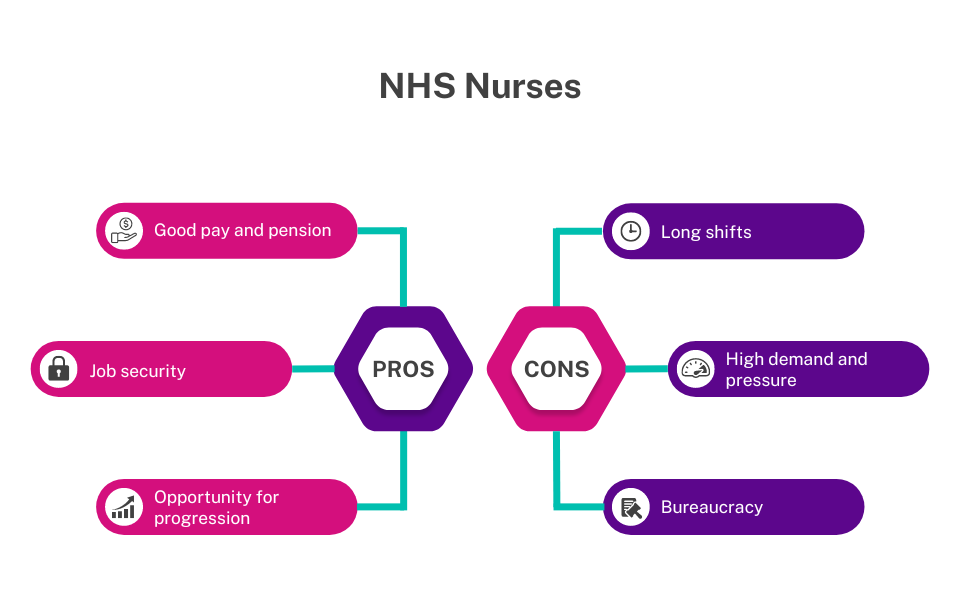.png)
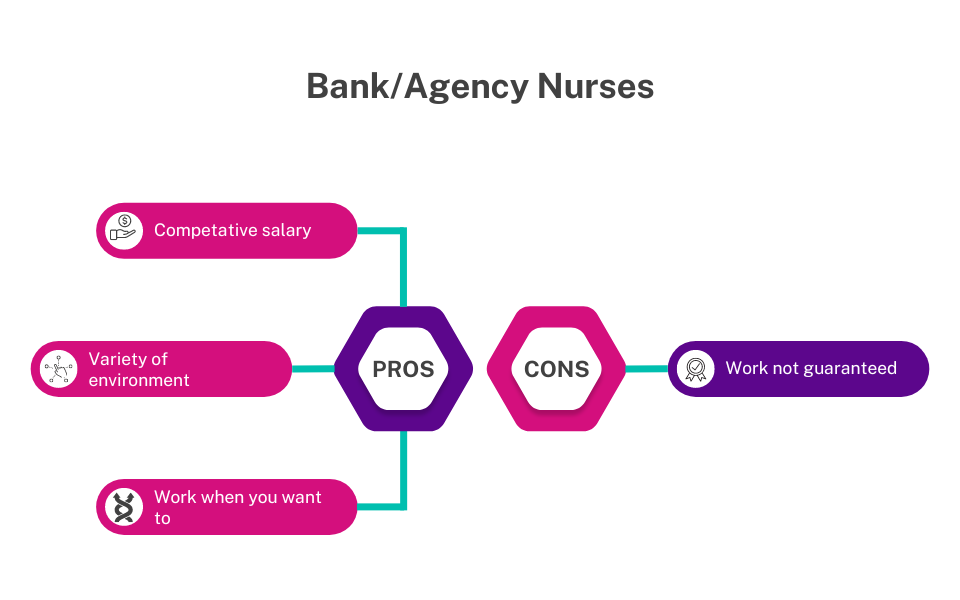.png)
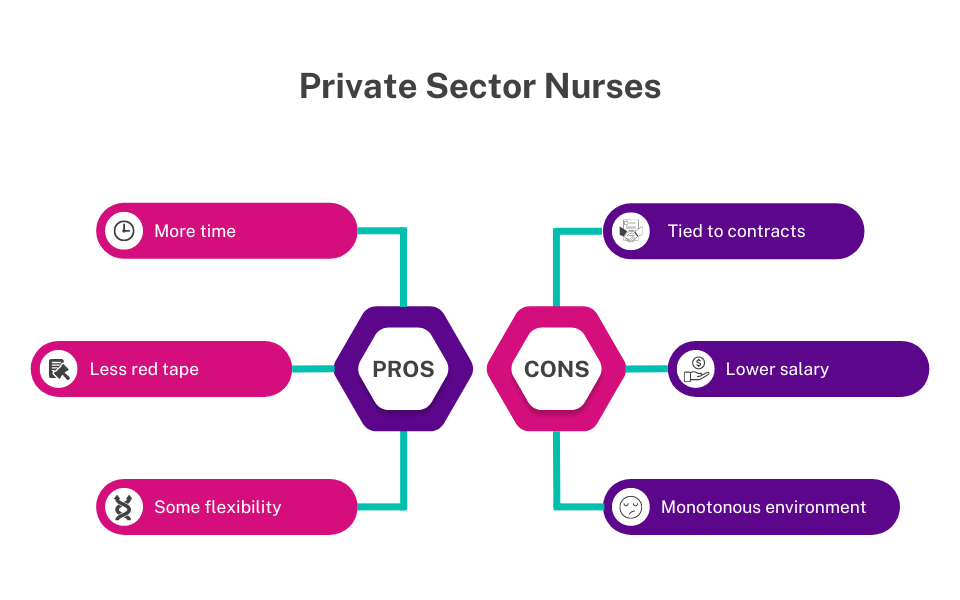.png)
Hopefully, you can take the advice given above to make an informed decision about choosing nursing as a career. No matter where you work or which career path you’d like to take when you choose to become a nurse you are choosing a career that is rewarding, challenging, and widely respected.
The journey to becoming a nurse can be difficult and, depending on which sector you choose to work in, nurses can often feel undervalued, pressured, and restricted in their profession.
In short, becoming a nurse isn’t without its downsides but we believe for the right people, nursing is a career that is essential to our society and consistently gives people the chance to develop and learn more. Our team will be happy to help you find shifts that fit your lifestyle and studies.
Posted on November 09, 2022 by Nurseplus
.png)
